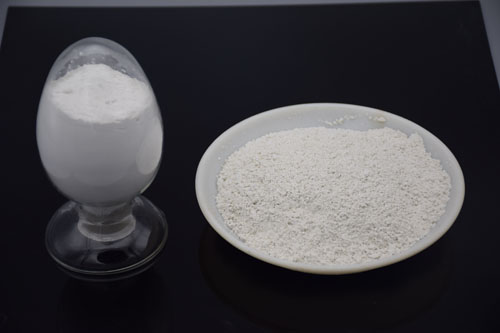PRODUCT
- 400-085-9099
- bentonite@zjhuate.com
- www.zjhuate.com
- Zhejiang province Anji County high Yu Zhejiang Tianzi Lake modern industrial park
Rheology Modifier BP-183-E
BP-183-E is an organoclay (tetraallkyl ammonium bentonite) for solvent-based systems of low to medium polarity.
1. Advantages:
BP-183-E is an organoclay (tetraallkyl ammonium bentonite) for solvent-based systems of low to medium polarity.
☆ Good gelling efficiency over low to medium polarity organic liquids.
☆ Ideal thixotropy property and anti-sediment property.
☆ Good viscosity and thickening property over a wide temperature range.
☆ Imparts particle suspension, preventing hard settling of pigment and fillers.
☆ Exerts strong film reinforce action in organic binder systems.
2. Typical Properties:
3. Typical Applications:
4. Incorporations:
BP-183-E belongs to the conventional type of organoclay group, which requires mechanical energy, shear forces applied with a goods dispersion equipment, and a chemical (polar) activator to reach the proper level of delamination of the organoclay platelet stacks.
Polar Activator: Dosage of polar activator (such as 95%ethanol, 95%methanol, 95%acetone or propylene carbonate) is 30%-60% by weight of BP-183-E.
It is always recommended to determine the proper level of addition by experiment. Either defect or excess of chemical activator would result
in poorer viscosity development.
5. Recommended Levels:
The amount of BP-183-E Rheology Modifier required depends upon the type
of organic system and the degree of thickening or other properties desired. Addition levels are typically between 0.2%-2.0% based on the total
formulation weight.
6.Packaging and Storage:
Brown paper packages plus internal polyethylene film bags,or paper packages with valve mouths are used.The weight of each package is generally 25±0.25 kg according to customer demands
BP-183-E is an organoclay (tetraallkyl ammonium bentonite) for solvent-based systems of low to medium polarity.
☆ Good gelling efficiency over low to medium polarity organic liquids.
☆ Ideal thixotropy property and anti-sediment property.
☆ Good viscosity and thickening property over a wide temperature range.
☆ Imparts particle suspension, preventing hard settling of pigment and fillers.
☆ Exerts strong film reinforce action in organic binder systems.
2. Typical Properties:
| Color | Appearance | Density |
Moisture (@105℃,2hrs) |
Fineness through 200 mesh |
Loss on Ignition ( @1000℃ ) |
| Light white | Free Flowing Powder | 1.7g/cm3 | ≤3.5% | ≥98% | ≤40% |
3. Typical Applications:
| ●Acrylic paint | ●Primer paint |
| ●Anti-corrosion paint | ●Road paint |
| ●Baking paint | ●Industrial paint |
| ●Sealant | ●Waster water treatment |
BP-183-E belongs to the conventional type of organoclay group, which requires mechanical energy, shear forces applied with a goods dispersion equipment, and a chemical (polar) activator to reach the proper level of delamination of the organoclay platelet stacks.
Polar Activator: Dosage of polar activator (such as 95%ethanol, 95%methanol, 95%acetone or propylene carbonate) is 30%-60% by weight of BP-183-E.
It is always recommended to determine the proper level of addition by experiment. Either defect or excess of chemical activator would result
in poorer viscosity development.
5. Recommended Levels:
The amount of BP-183-E Rheology Modifier required depends upon the type
of organic system and the degree of thickening or other properties desired. Addition levels are typically between 0.2%-2.0% based on the total
formulation weight.
6.Packaging and Storage:
Brown paper packages plus internal polyethylene film bags,or paper packages with valve mouths are used.The weight of each package is generally 25±0.25 kg according to customer demands





